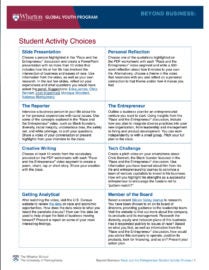This mini-site for high school students provides Wharton School-powered videos, readings, and activities to inspire deep thought and discussion around global business issues.
T he latest focus of our Explore Business discussions for high school students is an acronym that is transforming business: ESG.
ESG, which stands for Environmental, Social and Governance, has become the unifying lens people are using to evaluate companies’ efforts to do more than just make a financial profit. Stakeholders, including investors, are asking: how well does a company score on ESG? And yet ESG involves more than just screening a company’s beliefs and actions toward people and the planet. As firms try to contribute positively to the environment, address governance activities promoting sustainability, and support social causes, they are also thinking hard about how to incorporate ESG factors into their business strategies. They must meet the changing demands of investors, customers, employees and communities, and comply with new regulations.
This is a powerful and necessary conversation for the next generation. As future business leaders and contributors to the workplace and economy, today’s youth must build awareness about the ESG movement and explore their role as catalysts for this change.
This Explore Business mini-site delves into the second topic in the Wharton School’s recent Beyond Business Series: Redefining Corporate Governance. The “G” for Governance is an essential part of ESG as businesses embrace sustainable practices and align their purpose and mission more closely with environmental and social demands. Corporate governance describes the rules, practices and processes used to direct and manage a company, which is often overseen by a board of directors (refer to the Teachers Guide for more details).
In this discussion, Erika James, Dean of the Wharton School, joins a panel of experts to address the governance piece of ESG, in particular how boards can redefine corporate governance to maximize a company’s social impact while balancing the needs of all stakeholders. Dean James is joined in the discussion by Mary-Hunter “Mae” McDonnell, an associate professor of management at Wharton; Luke Taylor, a Wharton associate professor of finance; and Brian Stafford (W’98), CEO of Diligent Corporation, which develops and provides software that helps boards of directors meet modern challenges, like ESG.
The activities on this page connect to the ESG: Redefining Corporate Governance discussion and provide opportunities for high school students to Explore Business. The linked worksheets will help direct students’ exploration of the shorter video segments, with guided questions and defined vocabulary. We encourage students to enjoy discovering new business insights – and contributing their own ideas to this important conversation.
“As companies look to establish and amplify their roles as global corporate citizens, it’s important to consult the data…and discuss how thoughtful analysis can best support the burgeoning desires companies have to positively impact environmental and social causes.“
— Wharton Dean Erika James
The Full Discussion:
Redefining Corporate Governance
Explore the Main Video Themes with These Shorter Segments
1. Defining the G (Governance) in ESG
What do we really mean by Governance in the ESG discussion? Following a brief introduction to the full ESG governance theme, Professors Luke Taylor and Mae McDonnell offer a 50-year perspective on the evolution of corporate boards.
2. Corporate Boards Respond to Current Crises and ESG
Mae McDonnell and Brian Stafford discuss how corporate boards, in their role as crisis managers, are responding to COVID-19, social unrest, and the rise of ESG.
3. Trends in ESG Investing and How Investors Are Creating Impact
Finance professor Luke Taylor shares his research into ESG investing strategies and what his findings mean for corporate governance, as well as how ESG investors can create impact.
4. ESG and Diversity: Do Diverse Corporate Boards Perform Better?
Mae McDonnell and Brian Stafford address why companies that really care about ESG issues must embrace corporate boards that include more women, people of color and other types of diversity.
5. Tying Executive Compensation to ESG Performance
Boards grapple with an aspect of ESG that influences corporate pay policies: How executives are compensated. And should workers at all tiers be paid for strong corporate performance?
6. Practical Advice for Tomorrow’s Board Members
As the definition of corporate governance changes with ESG demands, boards need thoughtful, diverse leaders who explore organizations’ practices and people more deeply.
For Teachers and Students

The Teacher Guide is a resource to help educators understand the purpose of the Explore Business series of mini-sites on ESG and to provide guidance for using the videos and worksheets on this page with your students.
The Choice Board allows students to select individual projects and activities that help them reflect on Explore Business themes and apply them to their own experiences. The student activity choices are meant to support in-person and remote classroom learning.

Explore Business with Wharton Global Youth
Our Explore Business mini-sites are gateways to conversations, readings and activities that inspire high school students to think more deeply about issues affecting business and society. Dig into these Wharton-powered learning opportunities wherever and whenever you want to explore timely and compelling topics.





